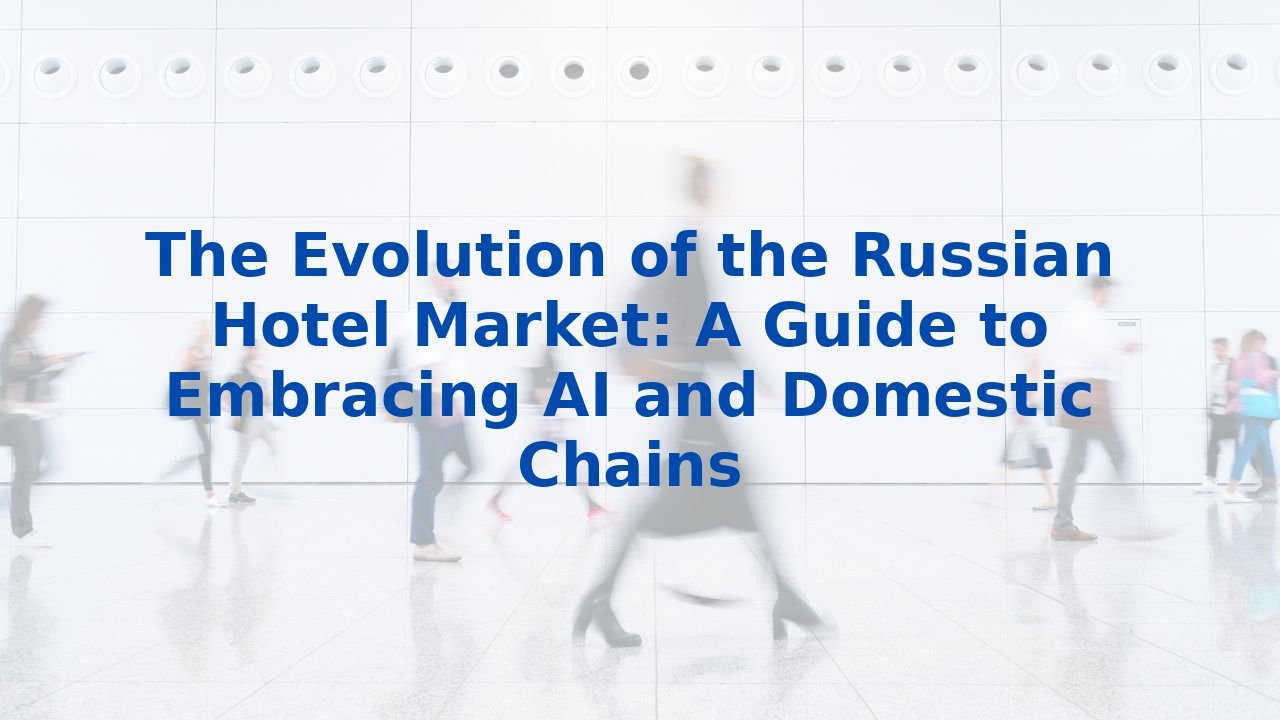The Evolution of the Russian Hotel Market: A Guide to Embracing AI and Domestic Chains
The Evolution of the Russian Hotel Market: A Guide to Embracing AI and Domestic Chains
The Russian hotel market is witnessing a remarkable evolution, shifting away from international chains towards a new wave of domestic brands that understand the unique preferences of local travelers. As these domestic chains emerge, they face opportunities and challenges that demand innovative solutions. Enter artificial intelligence (AI), a powerful catalyst set to redefine various business processes within this sector. Let’s delve into how AI is enhancing the hotel experience while emphasizing the importance of employee training in maximizing these advancements.
The Rise of Domestic Chains
In the wake of international brands exiting the Russian market, domestic hotel chains have stepped up to fill the gap, addressing the demand for a localized hospitality experience. This transition offers a unique understanding of Russian culture, preferences, and desires, inviting a level of personalization that generic international hotels often lack.
These chains are nimbler, more adaptable, and dexterous in tailoring their offerings to suit the domestic clientele. By leveraging local insights, they can create a more inviting and enriching experience for guests, promoting customer loyalty and increasing satisfaction.
Enhancing Business Processes with AI
The infusion of AI into the hotel industry ushers in a significant upgrade to existing business processes. Here are several key areas where AI is creating a transformative impact:
Customer Service
Imagine an AI-powered assistant available 24/7. With chatbots and virtual assistants, hotels can now deliver round-the-clock customer support for guest inquiries and requests. This shift not only refines the guest experience but also alleviates the workload of staff, freeing them to tackle more complex issues and deliver a higher level of service.
Operational Efficiency
Data is at the heart of operational excellence. AI algorithms can analyze this data to predict when maintenance is needed, manage energy consumption, and optimize housekeeping schedules. Such predictive analytics result in cost savings, reduced waste, and a smoother operation overall.
Personalization
AI can analyze vast amounts of guest data to provide curated recommendations for dining, entertainment, and leisure activities tailored specifically to individual preferences. This level of customization enhances the guest experience, making it more memorable and fostering repeat bookings.
Marketing and Sales
Gone are the days of generalized marketing strategies. With AI, hotels can dissect guest behavior to refine their marketing campaigns. Whether it’s personalized email outreach or targeted ads, predictive analytics can forecast demand, allowing for more informed and strategic marketing initiatives.
Benefits of AI Training for Employees
While AI technology propels the industry into new heights, the human element remains vital. Training employees to engage meaningfully with AI not only amplifies operational efficiency but also enriches their professional capabilities. Here’s how:
Enhanced Skills
AI training equips hotel staff with new competencies in data analysis, critical thinking, and decision-making. As they become adept at utilizing these technological advancements, they can derive actionable insights and contribute to operational success.
Improved Customer Service
With AI onboarding, employees gain a deeper understanding of how to leverage these tools to elevate customer service. They become proficient in using chatbots effectively, ensuring that guest inquiries are resolved swiftly and that personalized recommendations are delivered with confidence.
Adaptability
The hotel industry is constantly evolving, and training in AI prepares employees for rapid changes. Well-equipped staff can seamlessly adopt new technologies, helping to ensure that the hotel remains cutting-edge and competitive within an ever-shifting landscape.
Increased Productivity
By automating repetitive tasks, AI empowers staff to concentrate their efforts on more impactful duties that require human creativity and judgment. This not only enhances staff morale but also propels the overall productivity of hotel operations.
Conclusion
The Russian hotel market stands on the precipice of transformation, buoyed by domestic chains and the game-changing potential of AI. By embracing these advancements, hotels can refine their business processes to enhance operational efficiency and provide personalized guest experiences that drive loyalty.
However, these technological gains will only be realized through the meaningful training of employees. Investing in comprehensive AI training ensures a workforce well-prepared to navigate the complexities of modern hospitality. By intertwining technology with human ingenuity, the future of the Russian hotel market looks promising, poised for innovation and excellence.
By investing in AI training, hotels can ensure that their employees are equipped to handle the challenges and opportunities of the modern hospitality industry.



